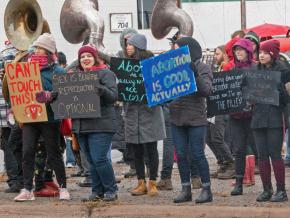Twin Cities Clinic Defense is born
reports on a counterprotest of anti-choice activists by Twin Cities Clinic Defense — and the importance of building an uncompromising fight for abortion rights.
NOVEMBER 4 marked the last of the “40 Days of Life” in St. Paul, Minnesota — and the first day of action by the Twin Cities Clinic Defense coalition.
The coalition’s formation, a joint effort of the Twin Cities Democratic Socialists of America (TCDSA) and International Socialist Organization (ISO), comes in response to egregious attacks on reproductive health rights and takes inspiration from NYC for Abortion Rights and Seattle Clinic Defense.
MacKenzie Brown, one of the protest organizers and a member of the TCDSA Socialist Feminist branch, notes that “there was no group doing long-term or regular defense of clinics that provide vital services like abortion, and we wanted that to change.”
Our first clinic defense took place on a cold, rainy Sunday. Despite the near-freezing weather, about 100 people came to support reproductive rights. One counterprotester, who works at a women’s shelter, said she came because “[r]eproductive rights are necessary and reproductive violence is killing us. Reproductive abuse keeps women subordinated, and we have to fight back.”

Another put it bluntly, “Nobody has the right to my body.”
The message from counterprotesters was clear: Minnesotans can take the cold, but we won’t let anyone take our sovereignty over our own bodies.
The pro-choice side brought and sustained a passionate and positive energy for the three-hour counterprotest, punctuated by chants such as “Not the church, not the state, people must decide our fate,” and “Pro-life is a lie! You don’t care if women die.”
Between and throughout, the chants were accompanied by the radical marching band Unlawful Assembly, which kept a rhythm to keep counterprotesters warm and their energy level high.
Children on the anti-choice side couldn’t help but watch the vibrancy of our side (and did some toe-tapping to our chants and tunes). Their protesting parents quietly huddled with their grotesque signs. Their protest was tucked away on a discreet side street — the result of our numbers and energy, and our decision to arrive 30 minutes before their planned protest in order to stake out our ground in front of the closed clinic.
We celebrated as the anti-choice protesters left 30 minutes earlier than planned, with a dud ending to their 40-day campaign.
THOUGH OUR clinic defense came after only two weeks of planning, MacKenzie sees it as a clear success, saying, “With more people counter-protesting, chanting and holding signs and the Unlawful Assembly anarchist marching band, we were stronger and louder than them, and they went home early!”
Though their campaign fizzled in the rain, the movement in the Twin Cities to fight back against attacks on reproductive freedom and trans rights is gaining momentum.
One of the protest organizers, ISO member Elizabeth Wrigley-Field, said:
I really thought about what I wanted to put on my sign, and what came to me was: “My life and my dreams are so much bigger than one fact about my body.” As soon as I thought of it, I knew it was exactly what I wanted to say.
A week before our clinic defense, I was at a beautiful protest where 5,000 people stretched from Minneapolis to St. Paul to defend trans rights and equality.
I was thinking about that when I wrote my sign: All of us, women and trans people and people with disabilities, are fighting so hard to not be reduced to what somebody else thinks is important about our bodies. And at both of these protests, I felt this tremendous sense of solidarity and determination that makes me feel so much hope for those fights.
Twin Cities Clinic Defense signed up about 40 new activists and circulated a flyer making the case for abortion rights as part of building toward a broad, intersectional reproductive rights movement.
MacKenzie stressed the importance of this:
Over and over again, we see poor people, people of color, trans and non-binary people, immigrants — already marginalized people — left to defend basic rights, because it hasn’t risen to the level of affecting the white majority.
We have to be defending health care rights now, because many women and people who can get pregnant are without resources to not have a child they do not desire, or to have the one they do. Defending reproductive health care is about defending individual rights to our bodies and well-being. Defending reproductive health care is about justice for all of us, and it is already a desperate need for far too many people.
As leftists and socialists, we need to be clear: Health care is a human right, and reproductive freedom is a human right.
Until those basic human needs are met for everyone, she says, “We need to be defending clinics and services with our bodies and voices in the streets.”


